Kingston SSDNow V+100 Review
by Anand Lal Shimpi on November 11, 2010 3:05 AM EST- Posted in
- Storage
- SSDs
- Kingston
- SSDNow V+100
Overall System Performance using PCMark Vantage
Next up is PCMark Vantage, another system-wide performance suite. For those of you who aren’t familiar with PCMark Vantage, it ends up being the most real-world-like hard drive test I can come up with. It runs things like application launches, file searches, web browsing, contacts searching, video playback, photo editing and other completely mundane but real-world tasks. I’ve described the benchmark in great detail before but if you’d like to read up on what it does in particular, take a look at Futuremark’s whitepaper on the benchmark; it’s not perfect, but it’s good enough to be a member of a comprehensive storage benchmark suite. Any performance impacts here would most likely be reflected in the real world.
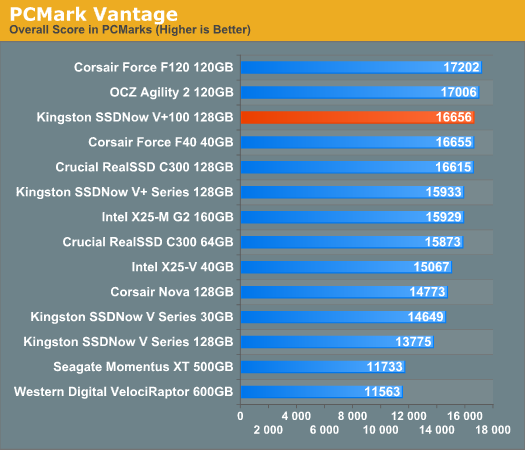
The SSDNow V+100 does very well here. Overall performance is in the top 3, higher than we’ve ever seen Kingston reach. In fact throughout the PCMark Vantage suite you'll see the SSDNow V+100 do very well. In some areas it's the fastest drive of the bunch (by a hair), while in others it's more of an average performer.
The Corsair Force F40 is the highest performing low capacity drive as you'd expect, beating out even the Intel X25-M G2. The 64GB C300 isn't too far behind however.
The memories suite includes a test involving importing pictures into Windows Photo Gallery and editing them, a fairly benign task that easily falls into the category of being very influenced by disk performance.
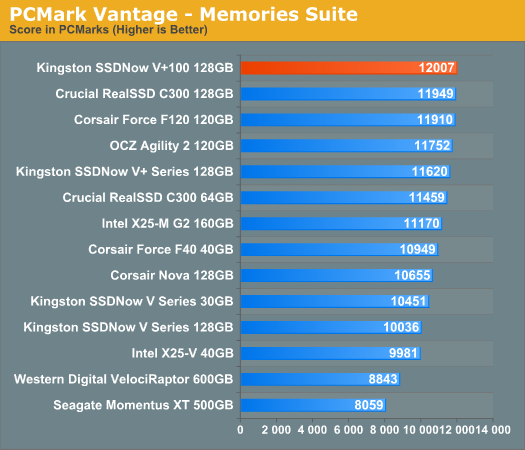
The TV and Movies tests focus on on video transcoding which is mostly CPU bound, but one of the tests involves Windows Media Center which tends to be disk bound.
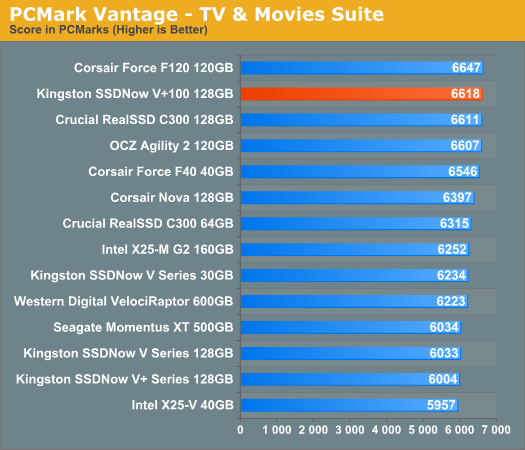
The gaming tests are very well suited to SSDs since they spend a good portion of their time focusing on reading textures and loading level data. All of the SSDs dominate here, but as you'll see later on in my gaming tests the benefits of an SSD really vary depending on the game. Take these results as a best case scenario of what can happen, not the norm.
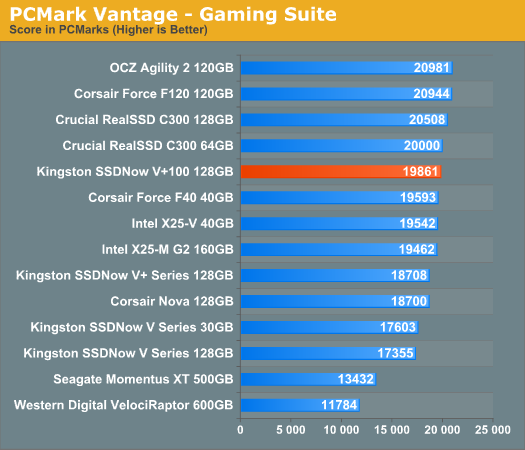
In the Music suite the main test is a multitasking scenario: the test simulates surfing the web in IE7, transcoding an audio file and adding music to Windows Media Player (the most disk intensive portion of the test).
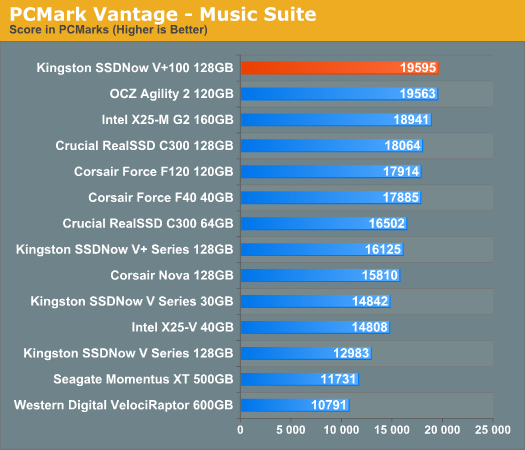
The Communications suite is made up of two tests, both involving light multitasking. The first test simulates data encryption/decryption while running message rules in Windows Mail. The second test simulates web surfing (including opening/closing tabs) in IE7, data decryption and running Windows Defender.
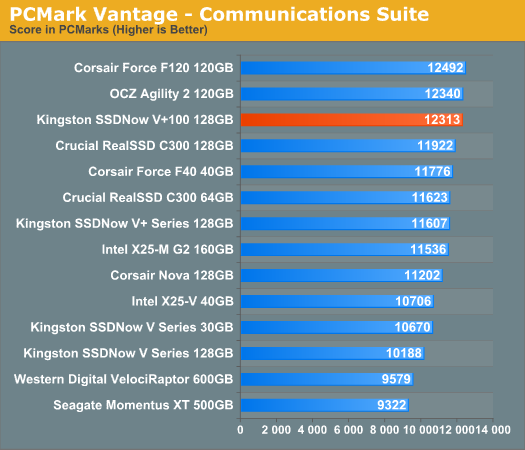
I love PCMark's Productivity test; in this test there are four tasks going on at once, searching through Windows contacts, searching through Windows Mail, browsing multiple webpages in IE7 and loading applications. This is as real world of a scenario as you get and it happens to be representative of one of the most frustrating HDD usage models - trying to do multiple things at once. There's nothing more annoying than trying to launch a simple application while you're doing other things in the background and have the load take forever.
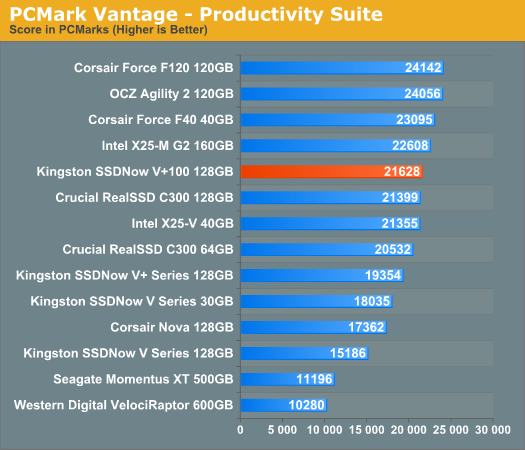
The final PCMark Vantage suite is HDD specific and this is where you'll see the biggest differences between the drives:
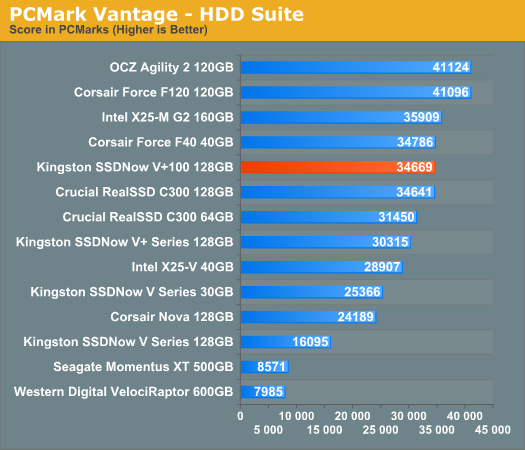
For pure I/O the SSDNow V+100 is good but not the best. Overall performance, as we've seen above looks to be pretty decent however. Let's keep going.










96 Comments
View All Comments
Taft12 - Thursday, November 11, 2010 - link
Can you comment on any penalty for 3Gbps SATA?I'm not convinced any SSD can exhibit any performance impact of the older standard except in the most contrived of benchmarks.
Sufo - Thursday, November 11, 2010 - link
Well, i've seen speeds spike above 375MB/s tho ofc this could well be erroneous reporting on windows' side. I haven't actually hooked the drive up to my 3gbps ports so in all honesty, i can't compare the two - perhaps i should run a couple of benches...Hacp - Thursday, November 11, 2010 - link
It seems that you recommend drives despite the results of your own storage bench. It shows that the Kingston is the premier ssd to have if you want a drive that handles multi-tasking well.Sandforce is nice if you do light tasks, but who the hell buys an ssd that only does well handling light tasks? No one!
JNo - Thursday, November 11, 2010 - link
"Sandforce is nice if you do light tasks, but who the hell buys an ssd that only does well handling light tasks? No one!"Er... I do. Well obviously I would want a drive that does well handling heavy task loads as well but there are limits to how much I can pay and the cost per gig of some of the better performers is significantly higher. Maybe money is no object for you but if I'm *absolutely honest* with myself, I only *very rarely* perform the type of very heavy loads that Anand uses in his heavy load bench (it has almost ridiculously levels of multi-tasking). So the premium for something that benefits me only 2-3% of the time is unjustified.
Anand Lal Shimpi - Thursday, November 11, 2010 - link
That's why I renamed our light benchmark a "typical" benchmark, because it's not really a light usage case but rather more of what you'd commonly do on a system. The Kingston drive does very well there and in a few other tests, which is why I'd recommend it - however concerns about price and write amplification keep it from being a knock out of the park.Take care,
Anand
OneArmedScissorB - Thursday, November 11, 2010 - link
"Sandforce is nice if you do light tasks, but who the hell buys an ssd that only does well handling light tasks? No one!"Uh...pretty much every single person who buys one for a laptop?
cjcoats - Thursday, November 11, 2010 - link
I have what may be an unusual access pattern -- seeks within a file -- that I haven'tseen any "standard" benchmarks for, and I'm curious how drives do under it, particularly
the Sandforce drives that depend upon (inherently sequential?) compression. Quite possibly, heavy database use has the same problem, but I haven't seen benchmarks on that, either.
I do meteorology and other environmental modeling, and frequently we want to "strip mine" the data in various selective ways. A typical data file might look like:
* Header stuff -- file description, etc.
* Sequence of time steps, each of which is an
> array of variables, each of which is a
+ 2-D or 3-D grid of values
For example, you might have a year's worth of hourly meteorology (about 9000 time steps),
for ten variables (of which temperature is the 2'nd), on a 250-row by 500-column grid.
So for this file, that's 0.5 MB per variable, 5 MB per time step, total size 45 GB, with
one file per year.
Now you might want to know, "What's the temperature for Christmas Eve?" The logical sequence of operations to be performed is:
1. Read the header
2. Compute timestep-record descriptions
3. Seek to { headersize + 8592*5MB + 500KB }
4. Read 0.5 MB
Now with a "conventional" disk, that's two seeks and two reads (assuming the header is not already cached by either the OS or the application), returning a result almost instantaneously.
But what does that mean for a Sandforce-style drive that relies on compression, and implicitly on reading the whole thing in sequence? Does it mean I need to issue the data request and then go take a coffee break? I remember too well when this sort of data was stored in sequential ASCII files, and such a request would mean "Go take a 3-martini lunch." ;-(
FunBunny2 - Thursday, November 11, 2010 - link
I've been asking for similar for a while. What I want to know from a test is how as SSD behaves as a data drive for a real database, DB2/Oracle/PostgreSQL with 10's of gig of data doing realistic random transactions. The compression used by SandForce becomes germane, in that engine writers are incorporating compression/security in storage. Whether one should use consumer/prosumer drives for real databases is not pertinent; people do.Shadowmaster625 - Thursday, November 11, 2010 - link
Yes I have been wondering about exactly this sort of thing too. I propose a seeking and logging benchmark. It should go something like this:Create a set of 100 log files. Some only a few bytes. Some with a few MB of random data.
Create one very large file for seek testing. Just make an uncompressed zip file filled with 1/3 videos and 1/3 temporary internet files and 1/3 documents.
The actual test should be two steps:
1 - Open one log file and write a few bytes onto the end of it. Then close the file.
2 - Open the seek test file and seek to random location and read a few bytes. Close the file.
Then I guess you just count the number of loops this can run in a minute. Maybe run two threads, each working on 50 files.
Shadowmaster625 - Thursday, November 11, 2010 - link
Intel charging too much, surely you must be joking!Do you know what the Dow Jones Industrial Average would be trading at if every DOW component (such as Intel) were to cut their margins down to the level of companies like Kingston? My guess would be about 3000. Something to keep in mind as we witness Bernanke's helicopter induced meltup...